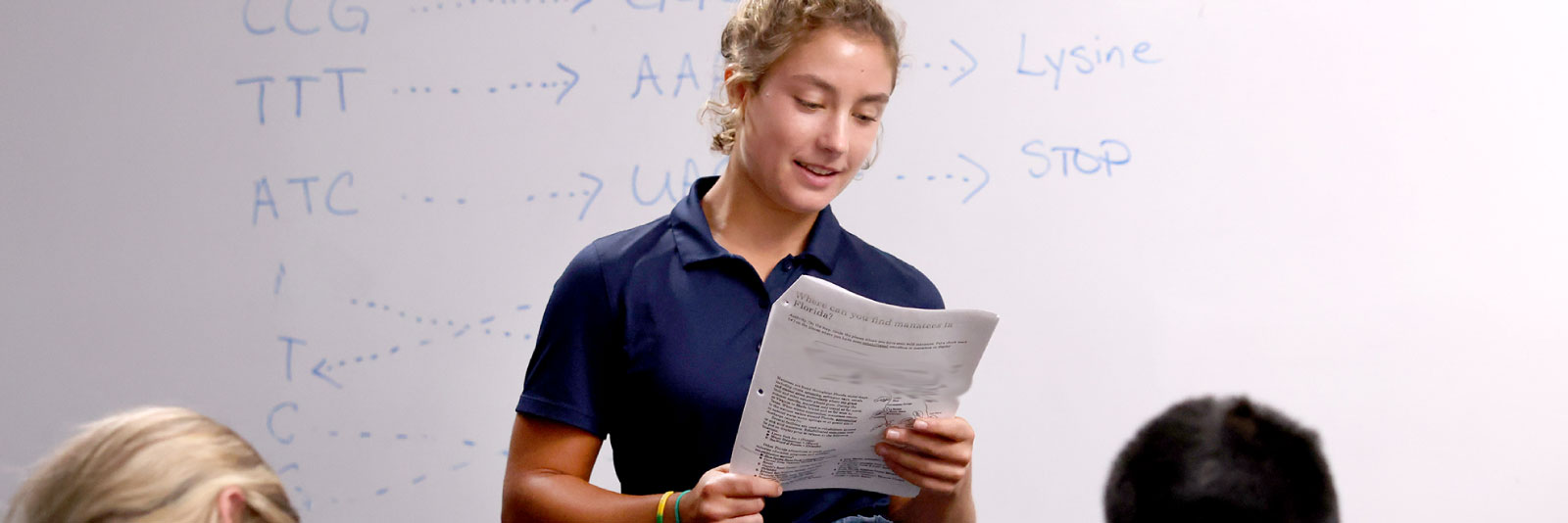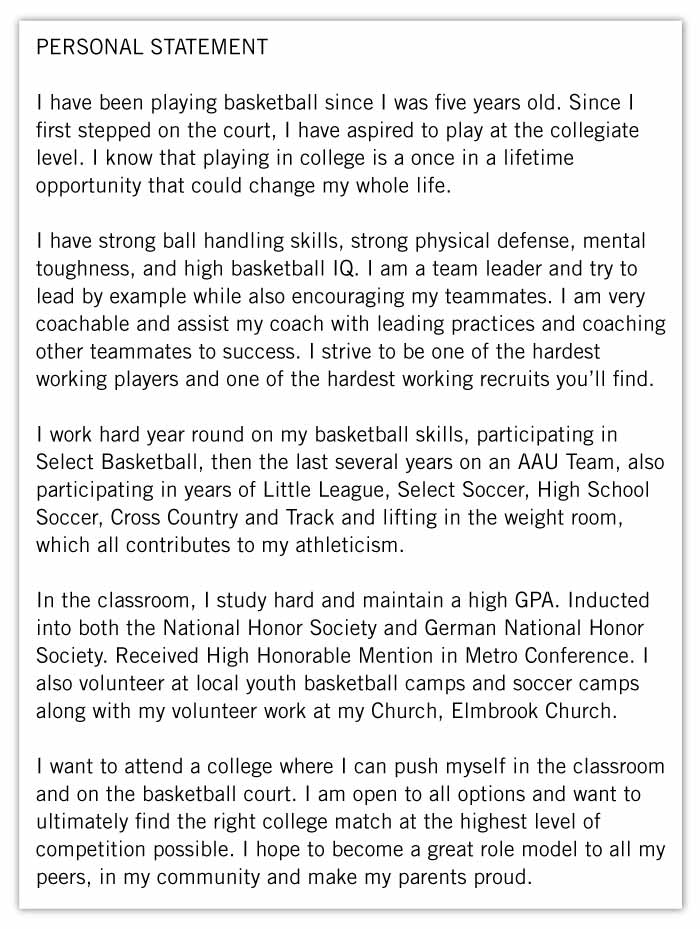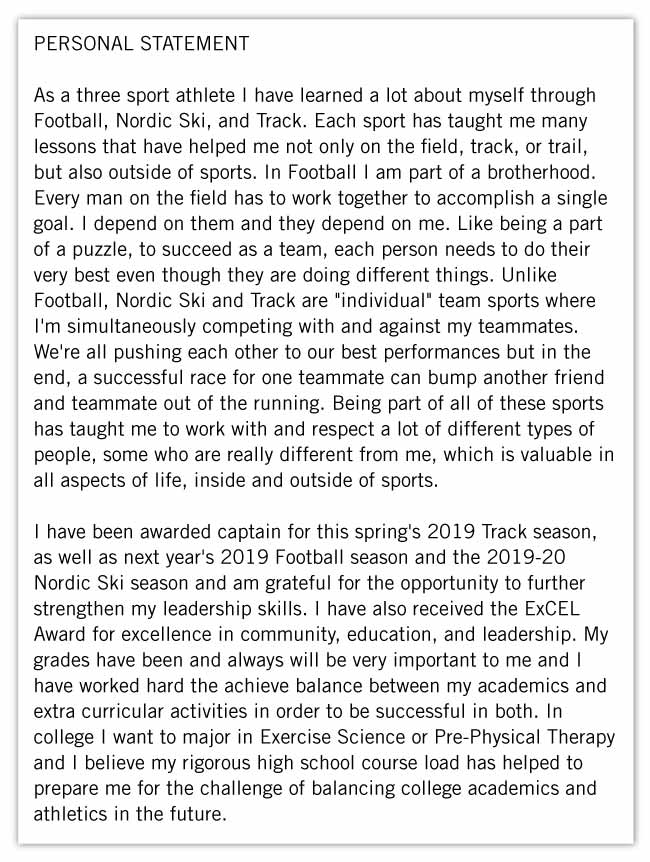Personal Statement Examples From student-athletes

What is a personal statement? A personal statement is your chance to show college coaches who you are outside of your academic and athletic life. It provides an opportunity to showcase your character, extracurricular activities, and anything else you would want a coach to know about you that they can’t get from stats or video.
As a student-athlete, you should include your personal statement in your NCSA athletic profile. You can also use the information from your personal statement to help formulate introduction letters or emails to college coaches.
4 Steps to Writing a Personal Statement
Step 1: Be yourself.
When writing your personal statement, be honest and be personal. This is something to keep at the forefront of your mind as you write and revise the statement.
There is no need to write this like an academic paper; instead, tell everything you want your recruiter to know about you. Don’t be ashamed to “boast” your achievements. At the same time, share your passions and what motivates you when it comes to your college future.
Step 2: Be specific.
Being specific in your personal statement means answering questions like “So what?” and “Why me?” when describing what you bring to your dream college team. This includes:
- Awards and accolades
- Academics (beyond what is displayed on your athletic profile)
- Experiences, hardships, and lessons learned
- Motivations
- Future goals
- Leadership roles
When writing your personal statement, use these questions as a guideline, but make sure your personal statement is unique to you. It should highlight what is impressive about you and your life, such as:
- What details of your life have influenced who you are?
- When and how did you become interested in your sport?
- What have you learned about yourself through playing your sport?
- What are your academic goals for high school? For college?
- Have you had to overcome any obstacles to get where you are?
- What unique characteristics or skills do you possess?
Step 3: Edit and proofread for spelling and grammar.
Once the first draft of your personal statement is written, review it and focus on:
- Spelling and grammatical errors
- Specificity
- Relevancy
- Clarity with simple, concise language
- Active voice (rather than passive voice)
Then, read the essay aloud to help catch additional mistakes and hear how the writing flows to identify areas of improvement. If you have family or friends who can proofread your personal statement, that will only make it better. This is your chance to shine and make a good impression on a college coach, so give your full effort.
Step 4: Rework your opening sentence.
Lastly, make sure to work on and rework your opening sentence to grab the reader’s attention. It should be personal to you, not using any clichés or quotes. This is arguably the most important part of the statement!
NCSA Personal Statement Examples
Seeking some inspiration for your NCSA personal statement? Review the two examples below from real student-athletes. What makes these statements flourish is that they do not simply repeat the baseline information in the players’ applications and athletic profiles.
Personal Statement for Women’s Basketball
Here is a personal statement from basketball player Laura Marx, hailing from Menomonee Falls, WI.

What did Laura do well here? For one, she provides plenty of specificity with detail on the exact basketball skills she brings to a team followed by her involvement in other sports clubs. This underscores her dedication to the sport.
Throughout the essay, her statements are clear and concise, staying on-topic to her personal passions and accomplishments.
Additionally, she emphasizes her involvement in academic organizations and the community, tying it all together with her desire to thrive both on the court and in the classroom.
Personal Statement for Men’s Football
Check out this personal statement from football player Cormac Shanoff of Little Falls, MN.

This personal statement begins strong by sharing his involvement in two other sports aside from football. This helps highlight his dedication and well-roundedness as an athlete.
He does an especially excellent job at keeping the statement truly personal, with the first section displaying a sense of authenticity and vulnerability. Cormac highlights life lessons he has learned from playing on a team, such as the importance of teamwork and camaraderie.
However, he doesn’t forget to be specific by addressing his sports awards, leadership skills, and academic goals.
How long should a personal statement be?
As a very general rule of thumb, the word count range for a personal statement is about 500 to 650 words. Ultimately, this depends on the specific requirements provided the university—so, pay attention to your application instructions.
For college sports, a personal statement length requirement might range anywhere from 200 to 650 words, for instance.
Does a personal statement matter?
Including a personal statement with your application is always a good idea, particularly if it’s a college you would really like to attend. If coaches are between two applications, a strong, well-written personal statement will help set you apart.
For student-athletes, meeting the college’s athletic standards is only the first step. Studies have shown that coaches place high importance on athletes’ character and coachability over pure athletic ability. Thus, demonstrating humility, patience, and willingness to learn is key when you are trying to stand out.
Get Recruited with more NCSA resources
Now that you’ve got a grasp on writing a sports-centric personal statement for college coaches, check out our College Recruiting Guide to dive more deeply into key areas of the recruiting process.
If you’re ready to build your free online athletic recruiting profile (including a personal statement) to tell coaches who you are, click here!